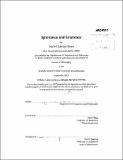| dc.contributor.advisor | Irene Heim. | en_US |
| dc.contributor.author | Meyer, Marie-Christine, Ph. D. Massachusetts Institute of Technology | en_US |
| dc.contributor.other | Massachusetts Institute of Technology. Department of Linguistics and Philosophy. | en_US |
| dc.date.accessioned | 2014-01-23T18:43:01Z | |
| dc.date.available | 2014-01-23T18:43:01Z | |
| dc.date.issued | 2013 | en_US |
| dc.identifier.uri | http://hdl.handle.net/1721.1/84420 | |
| dc.description | Thesis (Ph. D.)--Massachusetts Institute of Technology, Dept. of Linguistics and Philosophy, 2013. | en_US |
| dc.description | Cataloged from PDF version of thesis. | en_US |
| dc.description | Includes bibliographical references (pages 176-186). | en_US |
| dc.description.abstract | In this thesis, I propose a new theory of implicature. I argue that the two main theories available so far - the (Neo-)Gricean pragmatic theory on the one hand (e.g., Sauerland (2004)), and the hybrid grammatical theory of scalar implicatures on the other hand (e.g., Fox (2007)) - cannot provide a satisfactory account of disjunctions like Al drank some or all of the beers. As I will show, the meaning of these sentences is characterized by the presence of grammatical ignorance implicatures. In this they differ from their simpler alternatives. I will show how the proposed Matrix K theory of implicature derives this result. The new theory is a radically grammatical theory in that all kinds of implicatures - weak, scalar, and ignorance implicatures - are derived in the grammar. I will also show how Hurford's constraint can be derived from a general principle of manner in the new theory. I will then turn to logically under-informative statements like Some elephants are mammals and show how their oddness falls out from the Matrix K theory without further stipulations. Next, I argue that the theory extends to infelicitous Hurford disjunctions like Jean is from France or from Paris. Both phenomena can receive a uniform explanation in terms of grammatically derived, contextually inconsistent implicatures, without stipulating obligatory scalar implicatures. Lastly, I turn to the case of implicature suspension and show how the new theory can account for missing implicatures. | en_US |
| dc.description.statementofresponsibility | by Marie-Christine Meyer. | en_US |
| dc.format.extent | 186 pages | en_US |
| dc.language.iso | eng | en_US |
| dc.publisher | Massachusetts Institute of Technology | en_US |
| dc.rights | M.I.T. theses are protected by
copyright. They may be viewed from this source for any purpose, but
reproduction or distribution in any format is prohibited without written
permission. See provided URL for inquiries about permission. | en_US |
| dc.rights.uri | http://dspace.mit.edu/handle/1721.1/7582 | en_US |
| dc.subject | Linguistics and Philosophy. | en_US |
| dc.title | Ignorance and grammar | en_US |
| dc.type | Thesis | en_US |
| dc.description.degree | Ph.D. | en_US |
| dc.contributor.department | Massachusetts Institute of Technology. Department of Linguistics and Philosophy | |
| dc.identifier.oclc | 868026254 | en_US |
